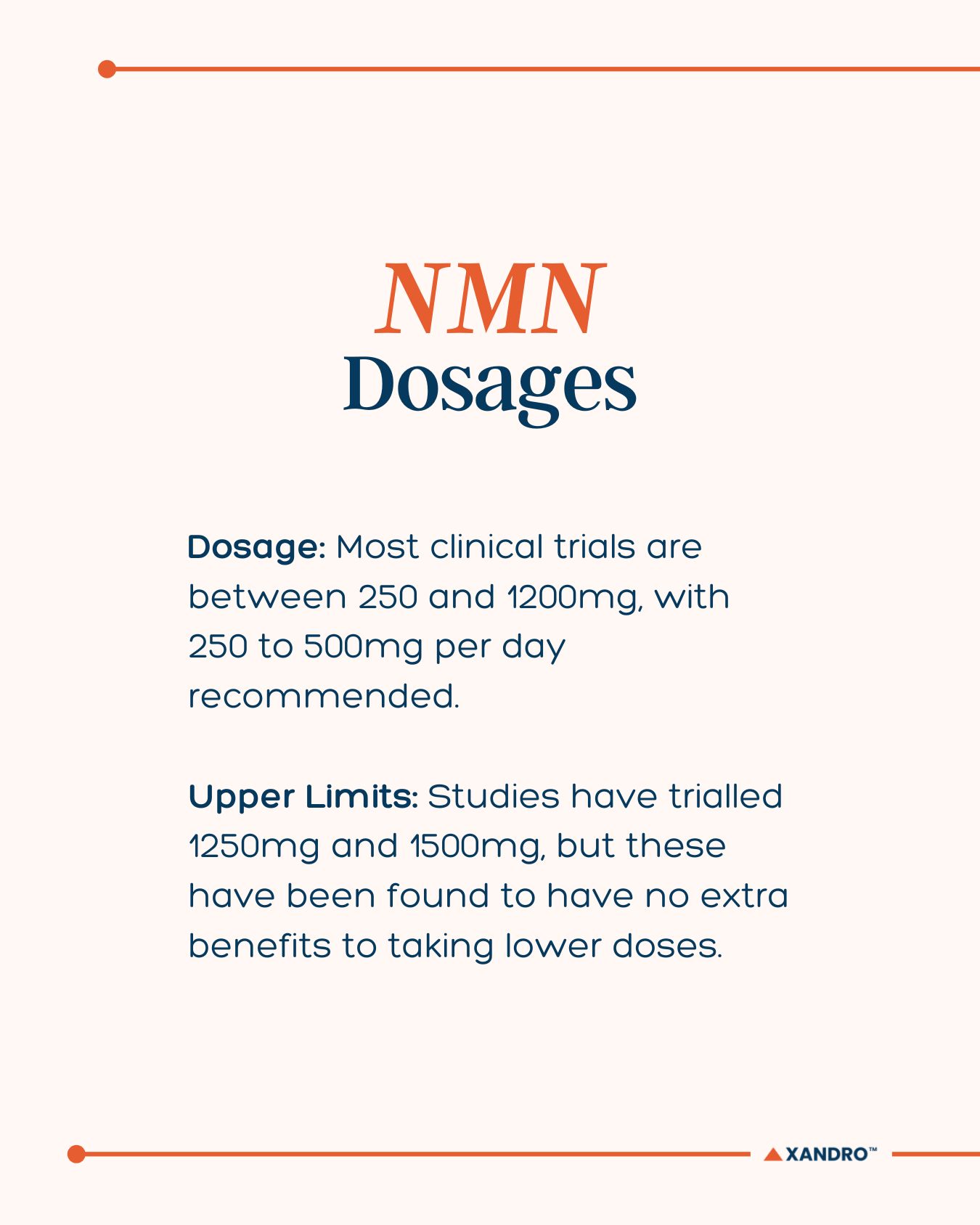What Is NMN? Safe Dosage, Benefits & Best Supplements Explained
5th Jan 2025
NMN Supplements: Safe Limits for Pure NMN
With all the information about longevity and how to increase your health span out there, it’s easy to get swayed into taking supplements you’ve heard great things about. Don’t let that fool you into believing that taking higher doses is better, though, as each supplement has its recommended dosage, the dosages used in clinical trials and then upper limits where taking more can become dangerous.
This blog will focus on the upper limits of taking NMN. Jump there now:
- What is NMN and What Does NMN Stand For?
- The Difference Between NMN and Nicotinamide
- What is an NMN Safe Dosage?
- Safe Upper Limits for NMN
NMN stands for nicotinamide mononucleotide and is a natural compound our bodies use to produce NAD+, which is vital for energy, repairing DNA and keeping cells healthy. As we age, NAD+ levels drop, which can lead to ageing-related issues like slower metabolism, cognitive decline and diseases such as Alzheimer’s.
Taking an NMN supplement can boost NAD+ levels, supporting healthy ageing. Some specific NMN benefits may include better energy, improved metabolism, weight management, improved brain function, better sleep and even potential longevity by maintaining healthier DNA and cells. It may also improve heart health, exercise performance and hair thinning.
Learn more about NMN for longevity.
It’s important not to get confused between nicotinamide mononucleotide (NMN) and nicotinamide; they are related compounds but differ in their structure, function and how they contribute to cellular processes.
Structure:
- NMN: A direct precursor to NAD+ (nicotinamide adenine dinucleotide) and contains a ribose sugar attached to a nicotinamide molecule.
- Nicotinamide: A simpler molecule that is part of NMN but does not include the ribose phosphate group.
Biological Function:
- NMN: A key intermediate in NAD+ biosynthesis and directly impacts energy production, DNA repair and cellular health.
- Nicotinamide: A form of vitamin B3 that supports general health but does not boost NAD+ levels as efficiently as NMN.
Therapeutic Potential:
- NMN: Often used for anti-ageing and metabolic health due to its efficiency in raising NAD+ levels.
- Nicotinamide: Commonly used in dermatology for skin health and general supplementation for vitamin B3 deficiencies.
Further Reading: The NMN Transporter
The amount of Nicotinamide from NMN
The amount of nicotinamide derived from 500mg of NMN depends on how NMN is metabolised in the body to form NAD+ and subsequently recycled through the NAD+ salvage pathway. The gut microbiome, health conditions, genetics, lifestyle and other factors influence how NMN is metabolised.
NMN has a molecular weight of 334.221g/mol, while nicotinamide has a molecular weight of 122.12g/mol. Based on molecular weights, 1mg of NMN could theoretically release 0.365 mg of nicotinamide, assuming full use of NMN in the body’s NAD+ metabolism.
So, 500mg of NMN could potentially yield ~182.5 mg of nicotinamide if all of it is converted into NAD+ and recycled. This estimate provides a general idea, but the actual amount of nicotinamide derived in vivo may vary.
Remember that not all NMN administered is converted to NAD+ or completely metabolised. The salvage pathway efficiency can vary based on NAD+ levels and cellular demand.
In Singapore, the Health Science Authority (HSA), provides vitamin and mineral limits in health supplements, and only provides a limit for nicotinamide (450mg), not NMN.
At the moment, HSA does not provide limits for NMN, but when they do, Xandro will comply with the guidelines. Both Xandro’s Pure NMN Capsules and Pure NMN Powder contain 500mg NMN.
Further Reading: How is NMN Made?
The safe limits for NMN supplementation are still being studied. Existing research and clinical trials provide some guidance into the NMN dosage per day to take to see results as well as a safe NMN upper limit.
So, how much NMN should I take? Most human studies use doses between 250mg to 1200mg per day ( 250mg, 300mg, 500mg, 600mg, 900mg, 1200mg), without significant adverse effects, but generally, you will find that the commonly recommended doses for general use are 250mg to 500mg each day.

It’s interesting to note that some studies have found taking higher doses of NMN showed no extra benefits than taking a medium dose, such as 1200mg compared to 600mg, although safety didn’t differ between these doses.
Another study tested the safety of NMN in men and women taking 1250mg daily and still found no severe adverse effects, while another found no adverse effects at doses of 1500mg. These are very high doses, with 250mg being the most common amount used in clinical studies.
Animal studies suggest even higher tolerability, but these findings may not directly translate to humans and since there is a lack of NMN long-term human clinical trials, it’s best not to take doses higher than above until more studies are finished.
End Note
There are still human clinical trials needed to test the best dosage of NMN for health benefits as well as for safety usage. Until then, have a chat with your doctor to see if taking NMN is right for you and which dosage would best suit your health needs.
If you’re looking for the best NMN supplement, Xandro’s Pure NMN Capsules and Pure NMN Powder can help raise your NMN and, in turn, NAD+ levels to help increase your health span.
Further Reading: Why Take Xandro NMN
